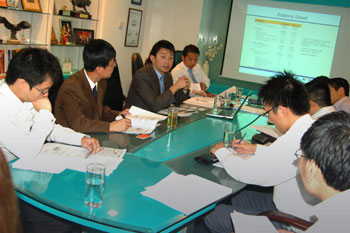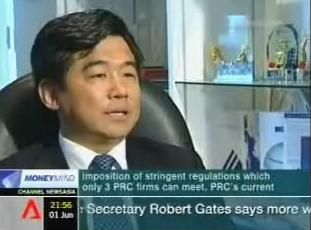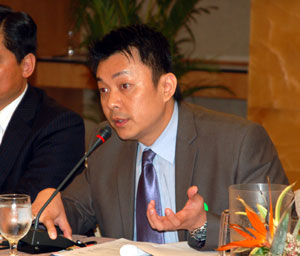
Stanley Leung, CFO, China Kangda. Photo by Sim Kih
CHINA KANGDA’S Annual General Meeting at M Hotel in Anson Road went smoothly with a handful of questions from shareholders.
The AGM yesterday morning (April 29) was followed by a Special General Meeting. Both were chaired by Stanley Leung, the company’s CFO.
Kangda is a leading food processor and PRC’s largest exporter of rabbit meat to Europe.
It was listed on the mainboard of the Singapore Exchange in Oct 2006. Its IPO price was 46 cents, substantially higher than the current market price of around 30 cents.
Q In recent months, Japan has sought to cut back food imports from China. Is China Kangda affected?
Stanley: There has been an impact on China enterprises exporting to Japan. We can fulfill the quality control requirements of the Japanese, so we have no problem exporting to Japan. We have many big customers in Japan who are in the restaurant business.
Q Many Chinese companies are facing increases in the cost of raw materials. Is China Kangda facing the problem also?
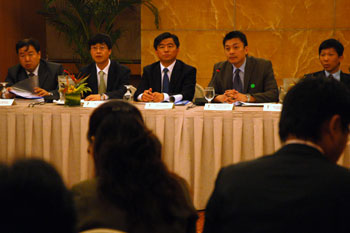
At the AGM, shareholders approved the mandates to buy back shares and to issue new shares. Photo by Sim Kih.
Stanley: Price increases in raw materials increase our cost of sales, but they are not significant. The majority of our raw materials such as chicken and rabbit meat are supplied by our own farms. That’s why we have many projects to invest in rabbit and chicken farms this year to reduce our cost of sales.
The other aspect I want to explain is the huge appreciation of the renminbi. Since January, it has risen more than 5%. Our board of directors have decided to sign contracts of hedging to reduce foreign currency risks. Another move is to sign contracts in local currency, such as Japanese yen, instead of the US$.
Q The company is seeking a mandate to issue shares as well as a mandate to buy back shares. Is that contradictory?
Stanley: There’s no contradiction. Regarding the share buyback, our board of directors consider our stock price to be very low. We have confidence in our future performance. The share buyback will give investors confidence in our performance. The mandate will start from June and lasts for a year.
As for the mandate to issue new shares, in future we have many projects to buy chicken and rabbit farms. We need the capital.
Q Your share buyback will lead to the shares purchased being cancelled or will they be kept as an investment?
Stanley: It will be to cancel the shares after the buyback.
Mr Tan, China Kangda lawyer: Just to clarify, the company’s by-laws do not allow for Treasury shares at the moment. If they undertake a share purchase, the shares will be cancelled.
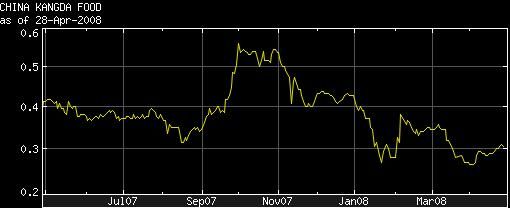
*****
Later in the evening, China Kangda reported a 56.6% surge in revenue to RMB 212.3 million on strong demand in its chicken and rabbit meat segments for the three months ended 31 March 2008 (“1Q 2008”).
Net profit attributable to shareholders increased 56.7% to RMB 30.1 million.
Selling and distribution expenses, which are mainly attributable to transportation costs, were well managed, falling 4.0% to RMB 2.4 million.
Sales from the rabbit meat segment surged 69.9% to RMB 35.3 million, with continued demand from the European Union (EU) and Russia. China Kangda remains one of the only three companies in the PRC with the required authorization to supply rabbit meat to the EU.
The chicken meat segment showed stellar growth of 151.0% to RMB 94.9 million on the back of robust domestic demand. Of these, nearly all of the domestic sales of chicken meat came under the Kangda brand.
| 2003 | 2004 | 2005 | 2006 | 2007 | Q1 ‘08 | |
Revenue | 155,372 | 345,271 | 447,652 | 506,962 | 728,407 | 212,263 (+56.6%) |
| Net profit (RMB ‘000) | 15,823 | 30,048 | 79,877 | 86,791 | 109,852 | 30,055 (+56.3%) |
Recent NextInsight story: CHINA KANGDA: Why rabbit meat sales will be key growth driver



